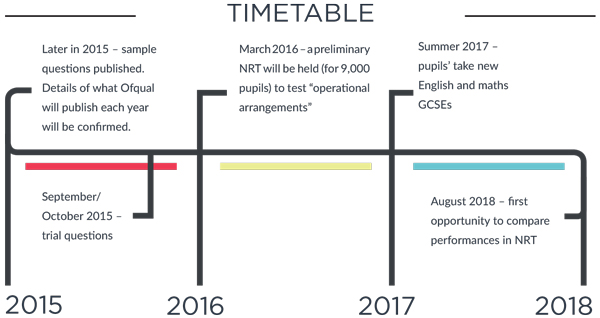The new national reference tests will go-ahead and be taken for the first time by roughly 18,000 students in February and March next year, Ofqual has confirmed.
First piloted in March this year, the tests involve a sample of Year 11 students sitting the exams each year in order to monitor, over time, how well cohorts of pupils are performing. The results act as a guide for increases or decreases in that cohort’s GCSE grades.
Just over 300 schools took part in this year’s trial, with 30 pupils from each school sitting an English test while another 30 took a maths exam. Each test took an hour.
Ofqual said the trial showed the test materials were “ready” and that administration of the test, provided by non-profit organisation NFER, had “worked well”.
The exams regulator added that marking of students’ responses and analysis of the test data also went to plan.
Sally Collier, Ofqual’s chief regulator, said: “The trial went very smoothly and has demonstrated that the test is ready to go live. We will make sure that schools taking part are well supported and more generally explain how the results have a clear potential to benefit GCSE awarding.”
The first official test will be held between February 20 and March 3 2017
The first official test will be held between February 20 and March 3 2017 by 300 schools that have been selected to take part, with about one in 40 students in year 11 then taking the test annually.
New laws came into force on September 1 making it mandatory for selected schools to take part in the tests, after headteachers hinted they may try to opt-out.
The test’s results are not given back to pupils and schools, but Ofqual will use the data to decide whether pupils’ performance is improving and strengthen the accuracy of GCSE awarding.
The announcement was welcomed by the Association of School and College Leaders (ASCL) who said the tests could resolve a “catch 22” situation.
Suzanne O’Farrell, curriculum and assessment specialist at ASCL, said: “The system for awarding GCSE grades is based on past experience of attainment and means grades are effectively capped.
“It is therefore difficult to reflect genuine improvements in pupil performance and this is unfair on young people and schools.
“The national reference test has the potential to address this situation by providing a year-on-year barometer of performance which we hope will help to guide the awarding of GCSEs in the future and ensure improvement is rewarded.”
Timetable for National Reference Test








If GCSE results improve, people will still moan about grade inflation despite reference tests.
It’s time to stop obsessing over ‘improvement’ – the OECD warned five years ago there was already too much emphasis on GCSE results in England and this could have negative consequences such as teaching to the test and ‘gaming’. Tests at 16 should be valued for the benefit they bring pupils: showing their achievement which in turn can decide post-16 progression. They shouldn’t be used to judge schools or pressurise them into showing year-on-year improvement. Rather, they should be reduced in number (as in most other countries where such tests exist) and contribute to graduation at 18 via multiple routes.
If I was a parent or young person faced with having to take a test but not being allowed to receive the results and the outcome of the test having absolutely no benefit to me or my child individually I would consider this completely unacceptable. Are students now merely monitoring units working for the DfE? Tail very much wagging the dog here.